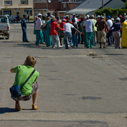The streets are a mess. Vuvuzelas and singing crawl along up ahead. Someone was allegedly beaten up yesterday for getting too close. The local paper showed a pretty serious head injury on a fairly unhappy-looking man. He told the reporter that he had been assaulted for telling a protestor to stop throwing bottles at cars in the street. Brad, one of my journ classmates, is talking to the strike leader about the incident while Thomas and I circle the singing, dancing crowd with cameras, imagining angles, anticipating the dancing crowd’s moves. In South Africa, singing and dancing are as much a part of the protest landscape as violence.
The strike leader tells Brad that the Grahamstown press misrepresented the story, that the unhappy man struck the protestor first. It’s the strikers’ word against that of a suburban everyman. The way South Africa divides and trusts its classes, the local paper has already weighed in with what will no doubt become the truth. I am discovering, that what really happened stopped being relevant a while ago. It’s about the stories that an event creates – parallel narratives exploding from a single origin somewhere in the orbit of this place, now lost.
Seeing cameras, the protestors sing a little louder. Occasionally posing, toying with us. Performing. From behind the crowd I can pick Brad out in my lens, talking to some students on the street corner about how they tried to pass the crowd and were threatened. Because they weren’t carrying cameras or notepads, special access passes to the space around the dancing crowd. I can’t help but be aware of the difference that being perceived a journalist makes. Spaces open. People talk. Press you to give life to their view of the world. Judge them right. Tell others.
Pan the lens right. Thomas is crouched in front of the protestors as they dance onwards down the street. Last we spoke, he was thinking of becoming a conflict reporter – going to the places nobody else wants to. Drawing close and returning with a slice of that space that the people without the cameras and notepads can’t go. We are five in the street, taking photographs and statements, relocating, taking more. Watching colleagues moving from point to point, I can’t help but wonder if we might find ourselves together again some years from now. I wonder how different that space will feel. How much it might feel the same. What the story will be. How we have changed.
Brad has moved on again, pushing someone else for their views. Thomas continues stalking the crowd, moving to a new vantage point. Not journalists yet, perhaps. But showing the character of them as loud as the clear singing and dancing. The imagined violence. The beginning of something, taking root in that place that only the people with notepads and cameras go.

